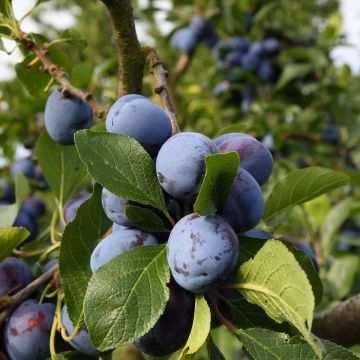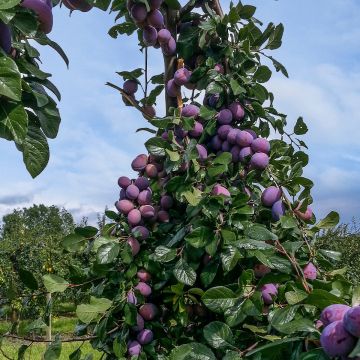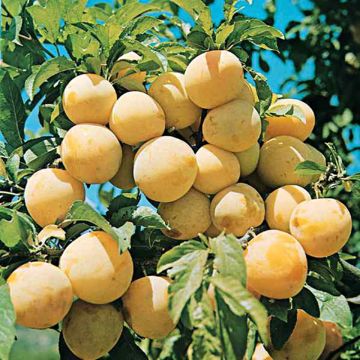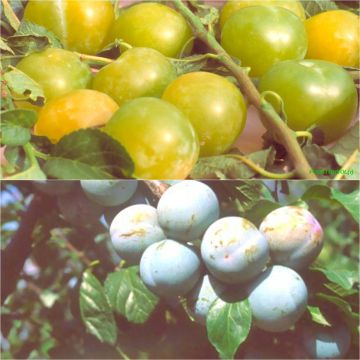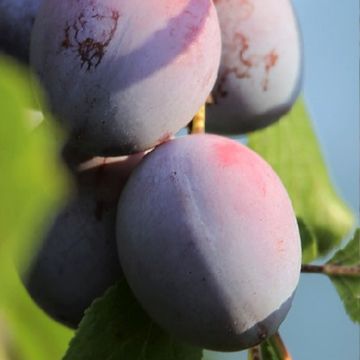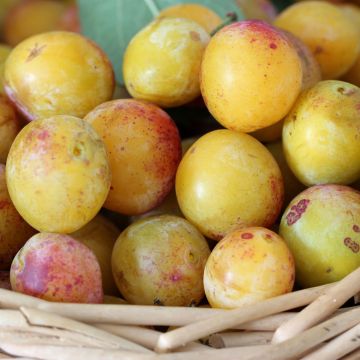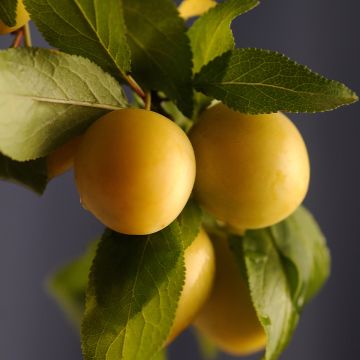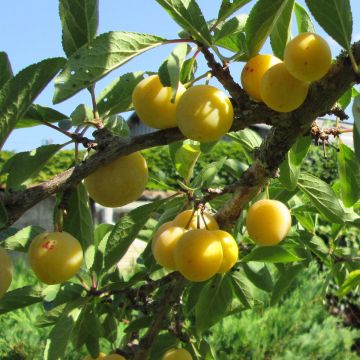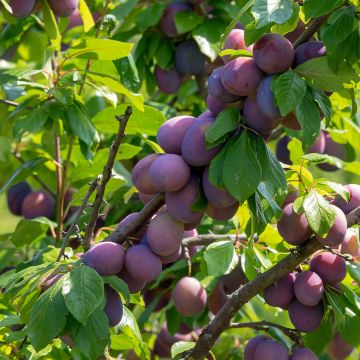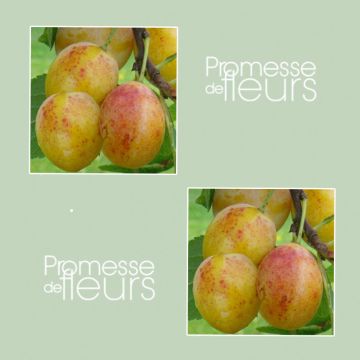

Prunus domestica Reine Claude Dorée - Organic Common plum
Prunus domestica Reine Claude Dorée ou verte
European plum, Common plum, Garden plum
Hello, Three years ago, I ordered a Golden or Green Reine Claude plum tree, and this year I got some rather yellow plums, ripe by the end of July. They seem to be more like Oullins plums, so I'm disappointed.
Brigitte Maréchal , 31/08/2024
This item cannot be shipped to the selected country
Oversize package delivery charge from €6.90
Delivery to Corse prohibited
More information
Schedule delivery date,
and select date in basket
This plant carries a 6 months recovery warranty
More information
We guarantee the quality of our plants for a full growing cycle, and will replace at our expense any plant that fails to recover under normal climatic and planting conditions.
Oversize package: home delivery by special carrier from €6.90 per order..
Express home delivery from €8.90.
Delivery to Corse prohibited: UE law prohibits the import of this plant from mainland France to Corse as part of the fight against Xylella fastidiosa. Please accept our sincere apologies.
More information

Description
The Golden or Green Reine Claude Plum is a self-fertile variety that is easy to grow. Its fruits ripen in mid-August and are round and globose, measuring 4cm (2in) in diameter. They have a thin skin that is green with a golden yellow hue when exposed to sunlight. The pale yellow flesh is juicy and sweet, with excellent taste qualities. It can be eaten fresh or processed. This variety is a good pollinator but is not self-fertile, so it requires the presence of another plum tree to fruit satisfactorily.
The original area of plums is believed to be Syria, not China. During the Roman hegemony over the region various local fruits, including the plum, were introduced to Rome. The Golden or Green Reine Claude Plum has been known since then. The Golden or Green Reine Claude Plum was named in honour of Claude of France, the wife of King Francis I, nicknamed "The Good Queen".
This fruit tree naturally reaches a height of up to 8m (26ft) at maturity. Its free and spreading silhouette is appreciated, and with proper pruning it will be easy to harvest. It requires little care and maintenance due to its natural openness. It thrives in full sun or partial shade and grows in all types of rich, moist, and deep soils, even heavy ones, but without limestone.
Its leaves are oval, almost oblong, with serrated edges and slightly pubescent. Flowering occurs in April for this semi-late variety. The tree is completely covered with white flowers that appear on the previous year's branches. It is not self-fertile, so it is necessary to plant another plum tree nearby: the Reine Claude d'Oullins or Mirabelle de Nancy varieties are particularly well-suited.
The fruits, Reine Claude plums, are round and globose, measuring 4cm (2in) in diameter. They have a thin skin that is green with a golden yellow hue when exposed to sunlight. The pale yellow flesh is juicy and sweet.
Slightly susceptible to fruit splitting before ripeness but without monilia, the Golden or Green Reine Claude Plum is a variety tolerant to Bark-Split disease and withstands handling and transportation well.
The plums are consumed fresh under the tree, in fruit salads, as well as in desserts, pastries, and as accompaniments to meats and savoury dishes. They can be transformed into jams, of course, but also into preserved fruits, compotes etc. They can also be used to make spirits.
Report an error about the product description
Plant habit
Fruit
Flowering
Foliage
Botanical data
Prunus
domestica
Reine Claude Dorée ou verte
Rosaceae
European plum, Common plum, Garden plum
Eastern Europe
Other Plum Trees
Planting and care
Easy to grow, the Golden or Green Reine Claude Plum Tree thrives in all types of light, rich, neutral or acidic soil, moist but not excessively humid, and free from limestone. Ensure drainage in the planting hole by adding a thin layer of gravel. Dig a hole two to three weeks before planting, twice as wide and deep as the pot. On planting day, place the tree with its pot in a basin of water, allowing the soil to be moistened through capillary action. Add compost to the bottom of the hole. Install the tree in the hole, fill with a mixture of soil and compost. Do not bury the graft union. Firmly tamp down the soil around the base. The root ball should be completely covered. Water generously.
In winter you can add a small handful of wood ash, rich in potash, to improve fruiting.
Planting period
Intended location
Care
-
, onOrder confirmed
Reply from on Promesse de fleurs
Haven't found what you were looking for?
Hardiness is the lowest winter temperature a plant can endure without suffering serious damage or even dying. However, hardiness is affected by location (a sheltered area, such as a patio), protection (winter cover) and soil type (hardiness is improved by well-drained soil).

Photo Sharing Terms & Conditions
In order to encourage gardeners to interact and share their experiences, Promesse de fleurs offers various media enabling content to be uploaded onto its Site - in particular via the ‘Photo sharing’ module.
The User agrees to refrain from:
- Posting any content that is illegal, prejudicial, insulting, racist, inciteful to hatred, revisionist, contrary to public decency, that infringes on privacy or on the privacy rights of third parties, in particular the publicity rights of persons and goods, intellectual property rights, or the right to privacy.
- Submitting content on behalf of a third party;
- Impersonate the identity of a third party and/or publish any personal information about a third party;
In general, the User undertakes to refrain from any unethical behaviour.
All Content (in particular text, comments, files, images, photos, videos, creative works, etc.), which may be subject to property or intellectual property rights, image or other private rights, shall remain the property of the User, subject to the limited rights granted by the terms of the licence granted by Promesse de fleurs as stated below. Users are at liberty to publish or not to publish such Content on the Site, notably via the ‘Photo Sharing’ facility, and accept that this Content shall be made public and freely accessible, notably on the Internet.
Users further acknowledge, undertake to have ,and guarantee that they hold all necessary rights and permissions to publish such material on the Site, in particular with regard to the legislation in force pertaining to any privacy, property, intellectual property, image, or contractual rights, or rights of any other nature. By publishing such Content on the Site, Users acknowledge accepting full liability as publishers of the Content within the meaning of the law, and grant Promesse de fleurs, free of charge, an inclusive, worldwide licence for the said Content for the entire duration of its publication, including all reproduction, representation, up/downloading, displaying, performing, transmission, and storage rights.
Users also grant permission for their name to be linked to the Content and accept that this link may not always be made available.
By engaging in posting material, Users consent to their Content becoming automatically accessible on the Internet, in particular on other sites and/or blogs and/or web pages of the Promesse de fleurs site, including in particular social pages and the Promesse de fleurs catalogue.
Users may secure the removal of entrusted content free of charge by issuing a simple request via our contact form.
The flowering period indicated on our website applies to countries and regions located in USDA zone 8 (France, the United Kingdom, Ireland, the Netherlands, etc.)
It will vary according to where you live:
- In zones 9 to 10 (Italy, Spain, Greece, etc.), flowering will occur about 2 to 4 weeks earlier.
- In zones 6 to 7 (Germany, Poland, Slovenia, and lower mountainous regions), flowering will be delayed by 2 to 3 weeks.
- In zone 5 (Central Europe, Scandinavia), blooming will be delayed by 3 to 5 weeks.
In temperate climates, pruning of spring-flowering shrubs (forsythia, spireas, etc.) should be done just after flowering.
Pruning of summer-flowering shrubs (Indian Lilac, Perovskia, etc.) can be done in winter or spring.
In cold regions as well as with frost-sensitive plants, avoid pruning too early when severe frosts may still occur.
The planting period indicated on our website applies to countries and regions located in USDA zone 8 (France, United Kingdom, Ireland, Netherlands).
It will vary according to where you live:
- In Mediterranean zones (Marseille, Madrid, Milan, etc.), autumn and winter are the best planting periods.
- In continental zones (Strasbourg, Munich, Vienna, etc.), delay planting by 2 to 3 weeks in spring and bring it forward by 2 to 4 weeks in autumn.
- In mountainous regions (the Alps, Pyrenees, Carpathians, etc.), it is best to plant in late spring (May-June) or late summer (August-September).
The harvesting period indicated on our website applies to countries and regions in USDA zone 8 (France, England, Ireland, the Netherlands).
In colder areas (Scandinavia, Poland, Austria...) fruit and vegetable harvests are likely to be delayed by 3-4 weeks.
In warmer areas (Italy, Spain, Greece, etc.), harvesting will probably take place earlier, depending on weather conditions.
The sowing periods indicated on our website apply to countries and regions within USDA Zone 8 (France, UK, Ireland, Netherlands).
In colder areas (Scandinavia, Poland, Austria...), delay any outdoor sowing by 3-4 weeks, or sow under glass.
In warmer climes (Italy, Spain, Greece, etc.), bring outdoor sowing forward by a few weeks.

































